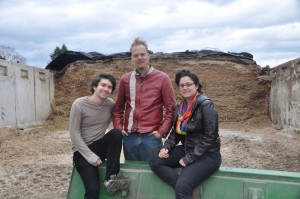2011-2012: In collaboration with the Natural Resources Conservation Service, this student team developed a treatment system for silage leachate for a small dairy farm in Massachusetts. Silage is a high-moisture forage material preserved through fermentation and often used as food for cattle. Silage production and storage can lead to a highly polluting leachate that if not properly treated can negatively impact water quality and aquatic ecosystems.
In the field, the team collected leachate samples and conducted surveys of the land and farm layout. The team reviewed current approaches for treating leachate, generated additional treatment ideas, and identified several ideas for lab-scale experimentation: filtration with limestone and biochar, cover crop application, and batch pH adjustments. The team designed and built a filtration set-up to test different filter materials and run experiments in parallel. Informed in part from the results of the experimental work, the team prepared a treatment design for the specific dairy farm that uses biochar as a filter medium but also employs a slow sand filter and a limestone gravel layer. The team developed a set of construction drawings/specifications and prepared a cost estimate.
The team’s proposed design for the small dairy farm is a pilot study and needs on-site verification after implementation.

